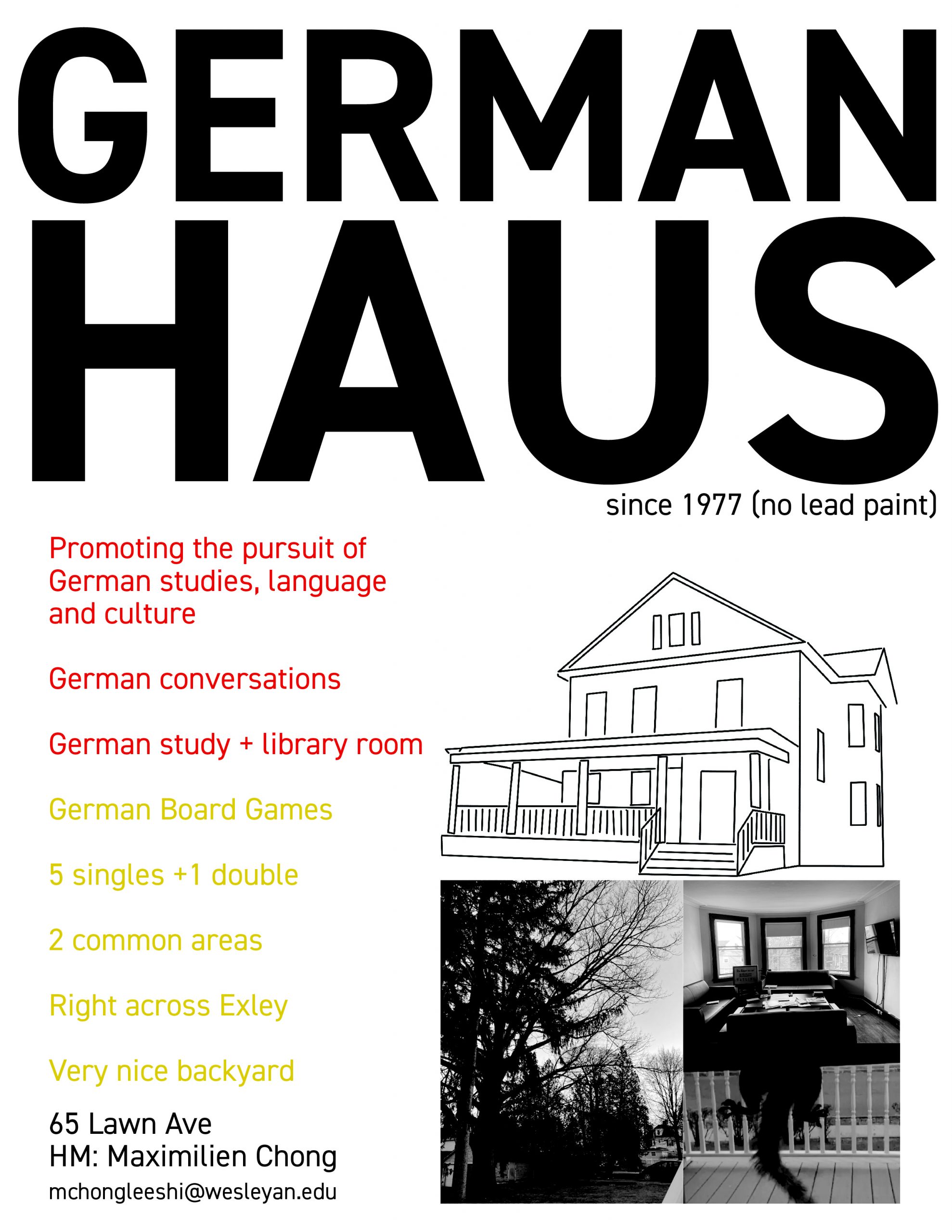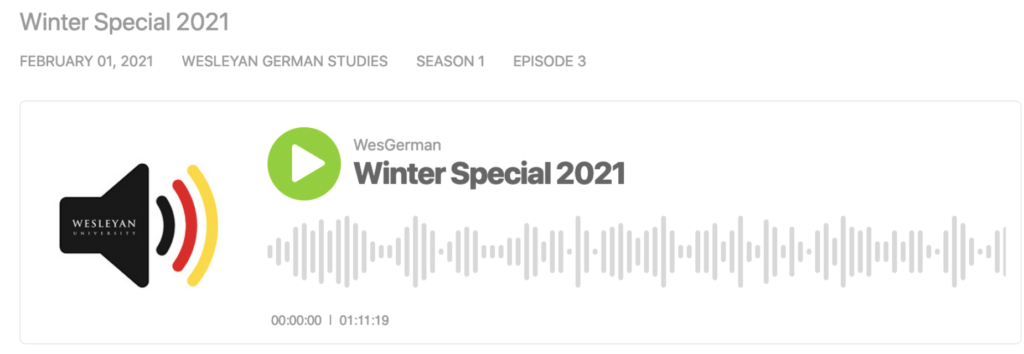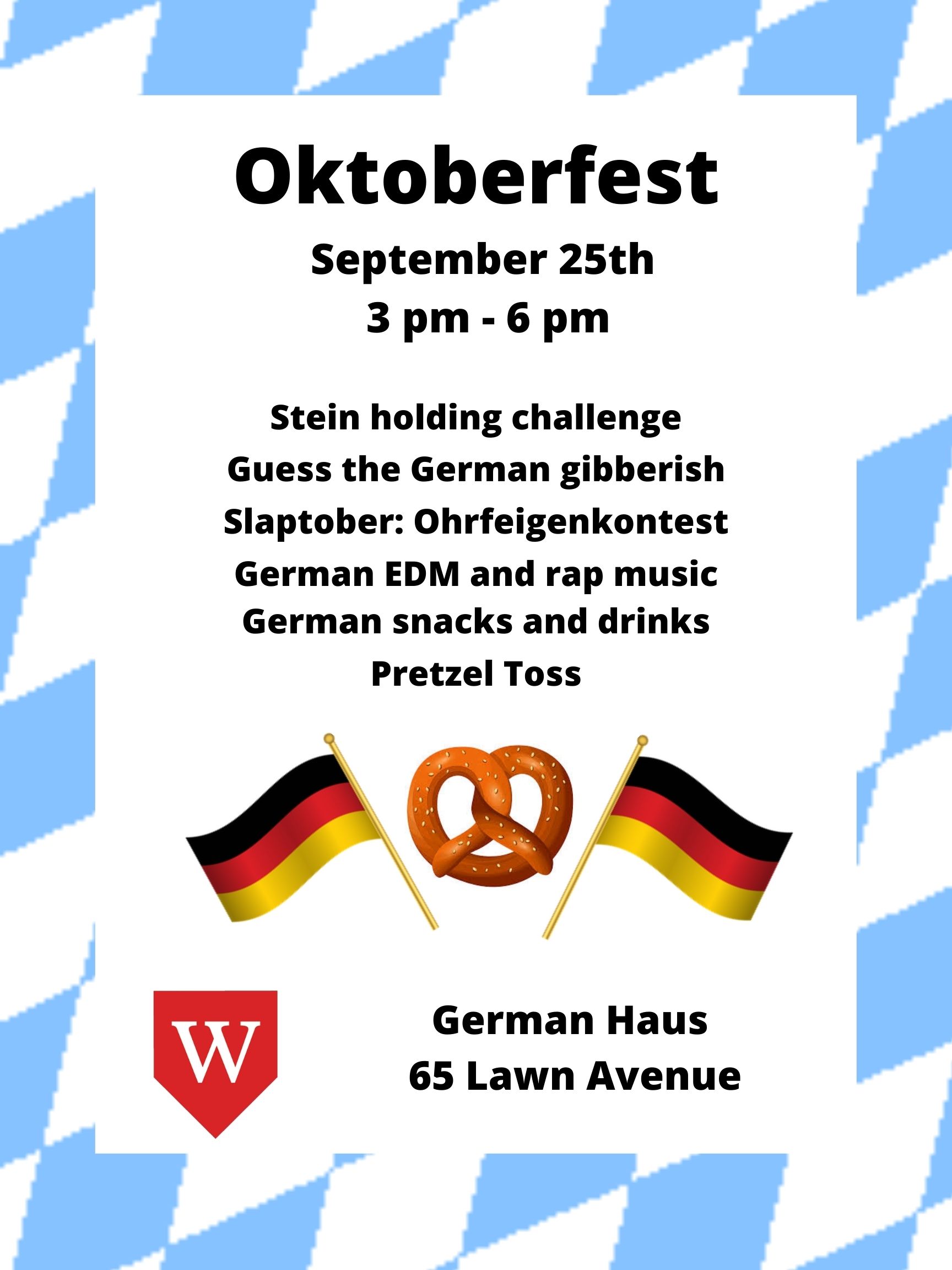
The Latest News about GRST majors and minors
Eva Mesler ’21 GRST and BIOL double major received honors for her thesis: “A Tale of Two Systems: An Analysis of German and American Healthcare Systems and their Contributions to Coronavirus Death Rates.” The thesis details the historical development of the healthcare systems in both Germany and the United
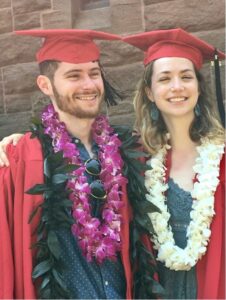
States over the course of the late 19th and into the 20th century. It then uses the insights gained from this analysis to compare and explain the variation in German and American responses to the coronavirus, focusing in particular on how each country provided care to those who fell ill. For her excellent work in German Studies, she received the Scott Prize. Eva is also the recipient of a German Academic Exchange Service Fellowship (DAAD), which will enable her to attend the Health Economics Master’s program at the University of Cologne or a similar program at the Technical University in Munich starting this fall.
Patrick Wolff ’21 GRST and ECON double major received the Congress-Bundestag Youth Exchange Fellowship (CBYX). He will embark for Germany in the late summer to attend classes at a German university followed by a six-month internship of his choice.
Jenna Lacey ’21 GRST minor and GOVT major received the John C. Blankenagel Prize for her dedication to studying German language and culture. She has been studying hard to prepare for the C1-German exam that she will have to pass in order to do graduate studies in Germany this or possibly next year.
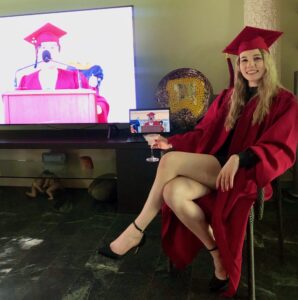
Alla Kiperman ’21 GRST minor and DANC major took online classes from her home in Vienna, Austria, last semester. She worked along three students from Munich University as Professor Bork-Goldfield’s Teaching Assistant. She met with beginning German students once a week practicing German. As the culmination of her Dance major and German Studies minor at Wesleyan University she has developed a dance theatre piece titled “A Portrait of Jenny.” This is a character exploration based on “Pirate Jenny” from Bertolt Brecht’s Die Dreigroschenoper or The Threepenny Opera. Alla’s interest in this particular character and play was sparked during her German Studies tutorial with Prof. Bäumel in Spring 2020, which was focused on Brecht and other prominent German playwrights of the 19th and 20th centuries. Challenging Brecht’s alienation effect through the lens of theatre and dance, she was aiming to give Jenny’s character a voice and make her story heard. It is a story of love, lust, pain, abuse, gender violence, betrayal, and overcoming: a story for all the “Jenny’s” among us and within us. Here is a YouTube link to a short teaser trailer of “A Portrait of Jenny“.
Over the summer Alla is planning to continue teaching dance at a local dance studio in Vienna, Austria, participate in various acting and dance workshops, take deep breaths, and enjoy some well-deserved time off with her family and friends.
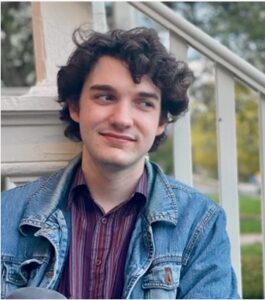
Julian White ’22 GRST minor and ENGL major was brave enough to become the producer of our WesGerman podcast. He received the Blankenagel Prize for his dedication to German. This summer he will be applying for a Fulbright Teaching Fellowship to teach English in Germany.
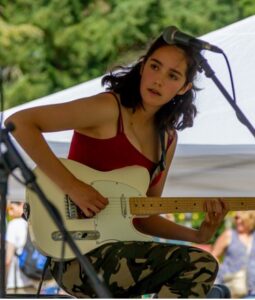
Iris Sackman ’22 GRST minor and FILM major was interviewed by Anna last month (see below) for the WesGerman podcast. Iris shared her thoughts on writing music and sharing her German song, “…ist es so weit?” (… is it time?)
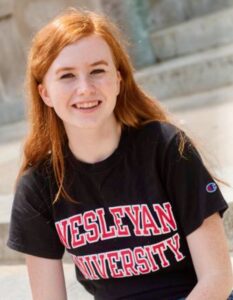
Anna Tjeltveit ’23 GRST and ENGL double major submitted outstanding and really fun music segments for our WesGerman podcast. She received the Prentice Price for her excellent work in German and her many fabulous contributions to the podcast. This summer she will be working as a camp counselor at Waldsee German Language Village, where she will teach German to campers between ages 6-17 using Immersion and Total Physical Response techniques to improve their listening and speaking abilities.
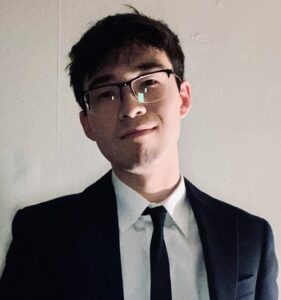
Jake Neuffer ’23 GRST and CSS double major will be working in Bozeman, Montana, where his family is from. While there, he plans on catching up on some reading, going hiking, and doing some writing on politics and fiction. On August 12th he will embark for Berlin, where he will spend a semester at the Duke in Berlin program, improving his German and observing Germany’s election first hand. Lucky him!
Sofia Khu ’22 GRST and COL double major will be taking a virtual class at Humboldt University with a DAAD scholarship this summer. Afterwards, she will be working on her COL thesis, a short novel which
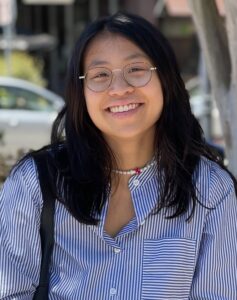
she started writing in Charlie Barber’s Longform Narrative class this past semester. It’s a Filipino-American immigration story centered around the relationship between a father and son.
Linus Mao ’23 GRST and COL double major plans to improve their German at the online summer program at the Freie Universität Berlin. Currently they are reading Roland Barthes, whose mourning diary after the death of his mother intrigues them very much.
Tohma Mitsuya ’23 GRST minor, ANTH and COL major will be working construction and landscaping in Big Sky, Montana, with three of his friends. Aside from that, he will also be playing lots of soccer, and basketball. He will go camping and on long hikes while brushing up on his photography. And of course, he will be reading lots of books delving into the classics of postmodern literature.

Bianca Ettinger ’23 GRST minor and double major in Molecular Biology and Chemistry will be traveling this summer to a small town outside Salzburg, Austria, to stay with her Oma and hopes to visit and explore Vienna and Berlin before studying abroad next Spring.
The sixth episode of the WesGerman podcast now online!

Check out the latest episode of the WesGerman podcast
The song Iris performs is called “Ist es soweit?” and you can find it also on Youtube here:
https://open.spotify.com/artist/5KiA8RaprArBMHARoJbWT6
WesGerman Podcast — Neue Episode
The fifth episode of the WesGerman podcast. Click here!
Segments:
1:12 – Musik mit Anna Tjeltveit: “Es kamen Menschen an” by Cem Karaca.
9:00 – Gespräch mit Jenna Lacey (Dept. Chair Frau Bork-Goldfield, student Julian White)
Frau Bork and Julian White’s favorite German words:
das Denkmal – monument
die Glockenblumen – bellflowers
die Schokoladenmousse – chocolate mousse
die Nachträglichkeit – afterwardness (I misspoke – Freudian slip!)
It’s a good time to get involved in German Studies at Wesleyan! For more info: https://www.wesleyan.edu/german/
Miranda Haymon ’16 talks about her career and what it meant to study abroad in Berlin

Miranda Haymon ’16, GRST and THEA double major discussed her career after graduation and her artistic process with Sam Morreale ’19 on March 17th. Her study abroad semester in Berlin during her sophomore played an important role in her life. She emphasized how important and helpful it was for her theatre career to be a GRST major and getting a liberal arts education. You can watch their conversation on YouTube.
Haymon’s upcoming radio play version of Pedro Pietri’s “The Masses Are Asses” (1974) will be aired on WESU Middletown 88.1FM this spring.

This picture was taken from Miranda’s bb_Brecht performance. Here is a video clip from it–> https://www.instagram.com/tv/CKMIonfjoq_/
You can follow Miranda on Instagram.
Miranda Haymon (she/they) is a Princess Grace Award/Honoraria-winning director, writer and curator. Recent projects include A Cakewalk (Garage Magazine & Gucci), Really, Really Gorgeous (The Tank), Everybody (Sarah Lawrence College), In the Penal Colony (Next Door @ New York Theatre Workshop, The Tank) and Mondo Tragic (National Black Theater). Haymon is a Resident Director at Roundabout Theatre Company and The Tank, a New Georges Affiliate Artist, a Usual Suspect at New York Theatre Workshop, a Space on Ryder Farm Creative Resident, member of the Lincoln Center Theater Directors Lab, and the Wingspace Mentorship Program. Haymon has held directing fellowships at WP Theater, New York Theatre Workshop, Manhattan Theatre Club, Roundabout Theatre Company, and Arena Stage. Haymon graduated from Wesleyan in 2016. For more information, please visit www.mirandahaymon.com.
Sam Morreale (they/them) is an advocate and facilitator for QTBIPOC+ storytellers and makers. Most of their work takes form through producing, directing, and consulting, particularly with a practice rooted in anti-racism and anti-oppression, transformative justice, healing and harm reduction. They have a unique view of the theatrical landscape, having worked in various capacities throughout the American Theater Industry quite early in their career. Recent Work: Facilitator/Curator for Rattlestick Playwright’s Theater, Community Conversations. Consultant: ART/NY, Center Theatre Group, Boston Court Pasadena.
Bridging the Gap with Germany during the Pandemic

By Iris Bork-Goldfield, Adj. Professor of German Studies
In March 2020, students were told to return from their study abroad programs, and we faculty were asked not to leave the U.S. Four of our students had just arrived at our Smith program in Hamburg, Germany, when they received that unwelcome message to pack again and return home. In the summer, I learned that our exchange student from Freiburg would not be coming to Wesleyan because of COVID. This meant that I would be without a teaching assistant from Germany in 2020/21. I contacted Munich’s Ludwig-Maximilians-Universität, my Alma Mater. I had graduated from LMU in German as a Foreign Language (Deutsch als Fremdsprache= DaF) and knew that students were required to do a teaching internship as part of their studies. I had done mine in China, but why not offer an online internship in the U.S., and why not at Wesleyan? I contacted the internship coordinator at the DaF Institut in Munich and sent her a description of our teaching internship, asking if she would announce it to their students.
Already a week later, I had the first response, followed quickly by several others. I interviewed several candidates via Zoom, explaining that they would be responsible for individual Oral Practice sessions (OPS) of 10-15 minutes each, with my Beginning German students. I kept the sessions short as no funding was available. The TAs were only to speak German and reinforce what my students had learned in my classes the week before. The three German tutors and I met once per week, usually on Fridays, to discuss what I had taught and share ideas about how to best practice the material, mainly vocabulary, grammar, and German culture. Later we also discussed what worked and what didn’t. One Wesleyan student, a native German speaker, who is currently attending classes from her hometown, Vienna, also joined us as a TA. She enrolled in a tutorial with me and will receive .5 credit for her work this semester. The students from Munich received an evaluation and an internship certificate from me which Munich University accepts as part of their studies. In early September 2020, my students had to sign up for an OPS and met with their German TA once a week, always at the same time.
My students’ evaluations showed how much they enjoyed these meetings with a student from Germany/Austria. Their only regret was that the sessions were so short. All four TAs agreed to continue working with my students and me this semester, and we agreed that they would meet with two students at a time and extend their sessions to 20-30 minutes each.
Another project bridging the “ocean” is the Tandem project, initiated by the Baden-Württemberg (BW) exchange program, which is administered by the University of Connecticut. They invite students from participating U.S. universities to sign up for a tandem partner from one of the universities in Baden-Württemberg. German students who study English at Heidelberg, Tübingen, Freiburg, Stuttgart, and Konstanz now meet with American students who study German at the intermediate or advanced level in Connecticut. They are meeting 11 times this semester for about 60-90 minutes per session via WebEx, Zoom or Microsoft Teams. Topics that should be covered are, for example:
- Everyday life as a student: What does a typical day in their life as a German/American student look like? What are the similarities and differences? What are current topics among students in Germany/the United States that are being discussed?
- Academics: How and when do students select the courses they are planning to take? Which platforms are being used for online instruction and administrative purposes (access to transcripts and grades, course registration, etc.)? Do students need to register for exams? If so, how do they do that?
- Baden-Württemberg vs. Connecticut: What are features specific to the region/city/state? What needs to be on every student’s bucket list for BW and CT?
The goal is to practice the language of the host country and divide the meeting time between German and English. Depending on the student’s level of fluency and familiarity with the other language, they may not need to correct each other’s vocabulary or pronunciation very much but should still pay attention to these details.
Students are expected to keep a journal and use the following questions as guidelines for their entries after each meeting with their Tandem partner:
- What topics did you talk about?
- Which was the dominant language during your conversation?
- What did you take away from this meeting?
- What did you learn about your host country, state, city, and /or university?
Three of our Wesleyan students signed up and now have a Tandem partner. Just as UConn awards credits to their students, we offer a half-credit group tutorial for our Wesleyan students.
Needless to say, these online meetings do not substitute for in-person meetings and study abroad, but they are a bridge to a world, and to people, that we currently cannot visit in person.
Published in Wes and the World Newsletter (03-04-21)
WesGerman Podcast- 4th episode
The fourth episode of the WesGerman podcast is out!
Segments:
1:54 – Musik mit Anna Tjeltveit (Wolf Biermann)
9:14 – Politik mit Jenna Lacey (German Parliament)
15:56 – Kunst mit Yasemin Schmitt
20:46 – Gespräch mit Hannah Landel (Eric Goldscheider)
Herr Goldscheider’s translation project: https://bertalandre.org/
Also, if you haven’t yet, subscribe to the show on Apple Podcasts or Spotify – that way you’ll be the first to know when another episode comes out!
Get in touch at germanpodcast@wesleyan.edu!
Contributions to Transatlantic Conversation on Jewish Identity
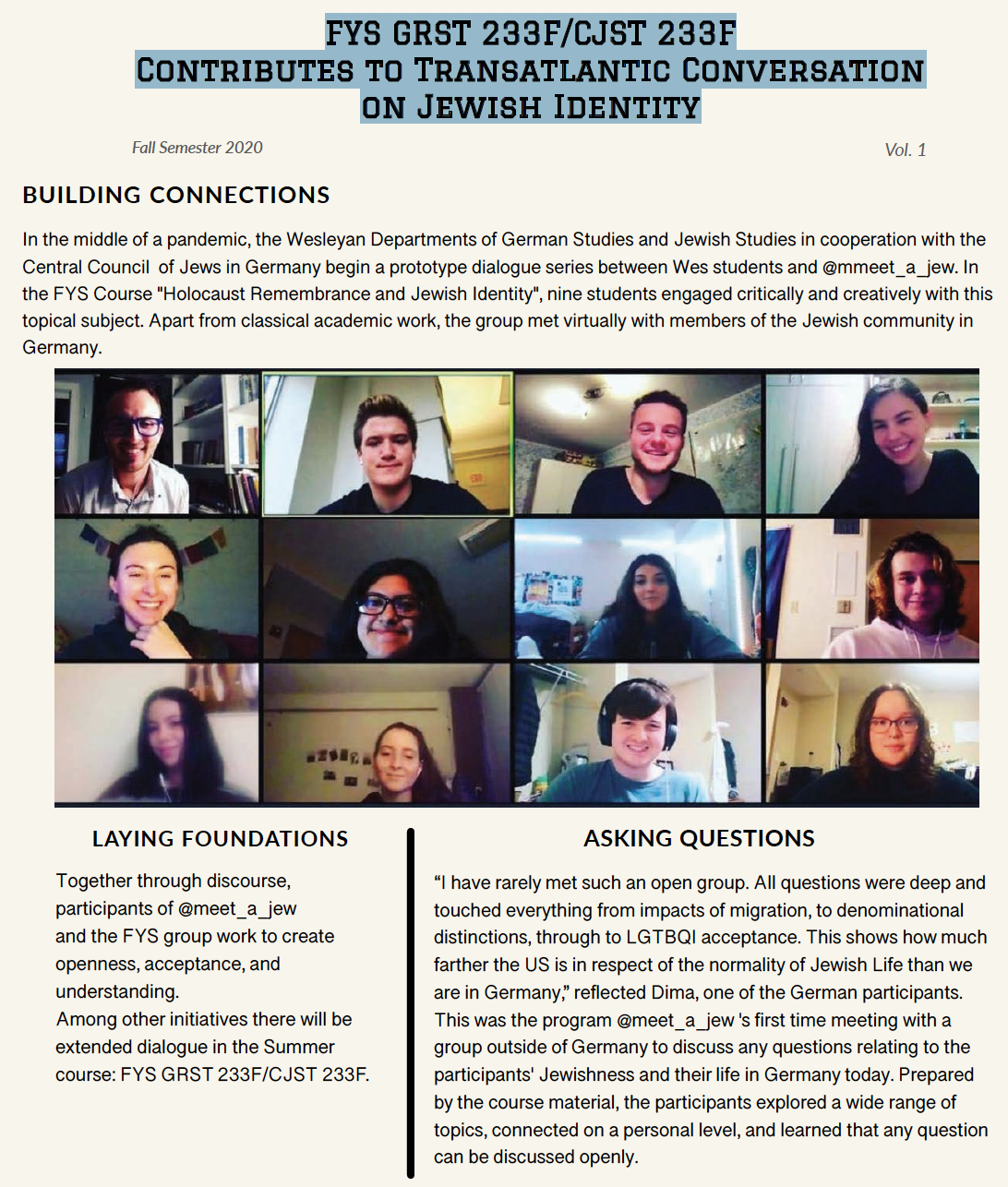
In the past fall semester, Wesleyan students in the First Year Seminar “Holocaust Remembrance in Germany: The Third Generation” participated in a pilot exchange with the Central Council of Jews in Germany. Made possible by the Departments of German Studies and Jewish Studies and the initiative “Meet a Jew”, these virtual meetings constituted the first of a series of transatlantic connections.
Working on theories of trauma and memory, this FYS focused especially on Jewish life in Germany today. Literary representations and academic texts made visible themes of identity, memory culture, anti-Semitism, homophobia, and xenophobia. A personal note was sounded in the meetings with young members of the Jewish community in Germany. Not only did these visits allow for contextualization of course material, they also covered more in-depth and personal accounts. Dima, one of the German participants reflected that “I have rarely met such an open group. All questions were deep and touched everything from impacts of migration, to denominational distinctions, through to LGBTQI acceptance. This shows how much farther the US is in respect of the normality of Jewish Life than we are in Germany.”
FYS courses at Wesleyan are specifically designed to introduce students to academic writing, reasoning, and arguing, as well as the tools to successfully work at the university level. This initiative added unreserved questions, open discussion, and personal connection to the rigorous academic schedule of the course. Students could reenvisage their paper topics and discuss real-world aspects of their textual analyses. The FYS “Holocaust Remembrance and Jewish Identity in Germany,” part of the FYS Summer 2021 program, will bring these exchanges to a new level. Students will have the chance to not only engage in class discussions but also in regular small group discussions.
Written by Thorsten Wilhelm, published in Wes and the World Newsletter (03-04-21)
Check out the Summer Course program for further information or contact Prof. Thorsten Wilhelm.
New WesGerman Podcast
Segments:
2:30 – Musik mit Anna Tjeltveit
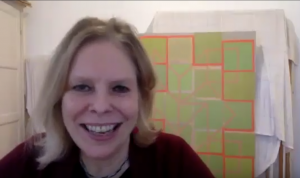
12:05 – Politik mit Anna Tjeltveit
18:00 – Kunstgespräch mit Yasemin Schmitt (Malerin Bettina Blohm)
40:25 – Gespräch mit Hannah Landel (Eric Goldscheider)
Music throughout is Octopus Ensemble’s June 2012 production of Haydn’s “The Seasons: Winter”
Many thanks to AATG for featuring us in their magazine, Aktuelles!
Erik Grimmer-Solem, Learning Empire: Globalization and German Quest for World Status, 1875-1919
The German Studies department would like to congratulate Erik Grimmer-Solem, (Professor of History and affiliated with German Studies) on his latest publication, Learning Empire: Globalization and the German Quest for World Status, 1875-1919 (Cambridge: Cambridge University Press, 2019). His book–as he tells his readers–“seeks to reshape our understanding of Imperial Germany’s history by reconstructing the complex overseas entanglements of Germans in North and South America, Japan, China, Southeast Asia, Russia, and Ottoman Turkey” https://egrimmer.faculty.wesleyan.edu/current-projects/research/.
Learning Empire has been widely reviewed in the US, Great Britain, Australia, and Germany. Dirk Bonker (Duke University) calls it an “impressive book” in which “Erik Grimmer-Solem offers a new narrative of the German Empire’s expansionist discourse and pursuit of global power from the 1870s through the 1910s” [German Studies Review, Volume 43, Number 2, May 2020, pp. 405-407]. Edward Ross Dickinson (University of California, Davis) calls Erik’s work “a remarkable undertaking, a hybrid work that is at once an ambitious and sustained synthesis of the massive scholarly literature on German imperial policy (Weltpolitik) and a study, founded on extensive archival research, of the role in shaping that policy of a small network of academic economists interested in the emerging capitalist world economy (Weltwirtschaft) [Journal of World History, December 2020, pp. 820-822]. Matthew P. Fitzpatrick (Flinders University, South Australia) calls the book a “landmark work of scholarship.” Erik “persuasively demonstrates that imperialism in the German Kaiserreich was not the product of the dominance of atavistic feudal remnants, but rather was an expression of the social, geopolitical and economic understanding of the globalizing middle classes of Germany. Beyond this, however, he also demonstrates that Germany’s liberal Weltpolitik was matched and eventually eclipsed by the expression of similar globalizing impulses in other nations, including the United States and Britain” [German History, Oxford University press, pre-publication book review]. And Gerhard Wegner (Frankfurter Allgemeine Zeitung) ends his positive review with: “Learning Empire bietet dem Leser eine höchst anregende Darstellung des Imperalismus aus der Perspektive zeitgenössischer Nationalökonomen” (January 18, 2021).
And available at Olin Libray

WesGerman Podcast – November Edition
- Anna Tjeltveit: German Rap, Adriano letzte Warnung
- Jenna Lacey: Left Wing Political Parties in Germany
- Yasemin Schmitt: Art in Germany during the Nazi-Era
- Hannah Landel: German Poetry
- Jules White: German Media Recommendation
WesGerman Podcast
This is the inaugural episode of the WesGerman podcast.
- Musik mit Anna Tjeltveit
- Politik mit Jenna Lacey
- Kunst mit Yasemin Schmitt
- Gespräch mit Hannah Landel
- Conclusion and Credits
Many, many thanks to Pablo Puente for the original music throughout.
To subscribe to this podcast, copy and paste the URL into the podcast app of your choice. If you have comments or suggestions please contact the podcast producers at germanpodcast@wesleyan.edu.




